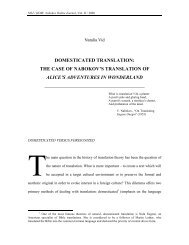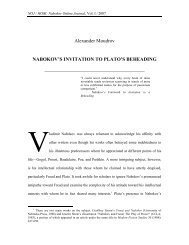You also want an ePaper? Increase the reach of your titles
YUMPU automatically turns print PDFs into web optimized ePapers that Google loves.
Nabokov Online Journal, Vol. V (2011)<br />
_______________________________________________________________________<br />
dismissed the rest of the charges” [308].) Humbert commits this violation by way of<br />
constantly misinterpreting his own criminal behavior as the work of an artist: “The gentle<br />
and dreamy regions through which I crept were the patrimonies of poets – not crime’s<br />
prowling ground” (131). Humbert may well be in the process of becoming a poet as he<br />
writes his memoir, but there are no indications that he had indeed been an artist while co-<br />
habiting with Lolita. Despite his constant claims to poetic sensibility, the meager proof of<br />
Humbert’s vocation as a writer are his magnum opus on French poetry (which seems<br />
never to be finished, suggesting a possible writer’s block), his perfume ads, and his<br />
poems addressed to Lolita and Quilty. The first poem sounds rather like a ditty, and the<br />
second is marred by such inelegances that Quilty, even in mortal danger, cannot help<br />
remarking: “A little repetitious, what?” (300). His delusions of artistic grandeur and of<br />
the poetic nature of his affliction (its originality of course compromised by his own<br />
rendering of numerous instances of pedophilia both in art and life) are abetted by his<br />
indifference to Lolita the human being for the sake of his imagination-concocted Lolita<br />
the nymphet. It is his perpetual ability to look the other way that renders him a criminal<br />
and a criminally bad artist: “I always preferred the mental hygiene of noninterference.<br />
Now, squirming and pleading with my own memory, I recall that on this and similar<br />
occasions, it was always my habit and method to ignore Lolita’s states of mind while<br />
comforting my own base self…. But I admit that a man of my power of imagination<br />
cannot plead personal ignorance of universal emotions” (287).<br />
Humbert’s artistic delusion is pierced with the aid of the novel’s parodic<br />
doubling, which presents a mirror in which the trite and clichéd confronts its own<br />
reflection, recognizing its insufficiencies such that it can attempt to transcend them. This<br />
is the mechanism behind the existence of the vulgar Clare Quilty, whom Humbert<br />
ritualistically eliminates as that part of himself that is in bad taste before endeavoring to<br />
correct aesthetically the damage he has caused; and behind the playful undercutting of the<br />
reader’s expectations, by which recognizable generic conventions are presented, and then<br />
with a wink taken in unexpected directions. 17<br />
17 Appel proposes that the targets of the novel’s parodic devices are the reader’s expectations: “The novel<br />
becomes a gameboard on which, through parody, Nabokov assaults the conventions and the worst<br />
pretensions of his readers” (“Lolita: The Springboard of Parody” 221). Although Nabokov himself states<br />
11

















